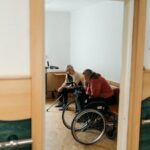Mild cognitive impairment (MCI) serves as an early warning signal for potential Alzheimer’s disease or dementia. Recognising such cognitive declines early can pave the way for timely interventions, which might significantly improve outcomes. However, the challenge lies in the diagnosis of MCI, which is often a protracted and complex process. This is particularly true in rural settings, where licensed neuropsychologists are scarce.
In response to the need for more accessible cognitive assessments, an innovative project was initiated by a team from the University of Missouri. They developed a portable system to evaluate various aspects of motor function efficiently. This system, which is both easy to use and cost-effective, integrates a depth camera, a force plate, and an interface board, making it an all-in-one solution for mobile cognitive assessment.
The project brought together an interdisciplinary team from Mizzou, including Trent Guess, an associate professor in the College of Health Sciences; Jamie Hall, an associate teaching professor in the same college; and Praveen Rao, an assistant professor in the College of Engineering. Their research recently involved studying older adults, including some with MCI, who were tasked with performing a set of activities—standing still, walking, and getting up from a seated position on a bench. Uniquely, these tasks were performed while the participants counted backwards in seven intervals.
The data collected by the innovative portable system was analysed through a machine learning model, a form of artificial intelligence, which impressively identified 83% of the study participants with MCI. Guess explained that the brain areas affected by cognitive impairment also play a role in motor functions. Therefore, even minimal impairments can affect motor skills, such as balance and walking speed, which the new device is specially designed to detect—subtleties that might not be noticeable through mere observation.
With projections from the Centers for Disease Control and Prevention indicating that the number of Americans with Alzheimer’s disease might more than double by 2060, this portable device holds significant potential. Given that MCI can precede Alzheimer’s and dementia, its early detection can benefit millions of older adults.
“Alzheimer’s disease poses a substantial challenge in the U.S. Early identification of affected individuals is crucial as it allows for interventions that can slow or even halt the disease’s progression,” Hall noted. He also pointed out the disparity in clinical diagnoses, with only about 8% of those believed to have MCI receiving a diagnosis. The team’s vision extends to deploying this portable system across various public health and community settings, such as county health departments, assisted living facilities, community centres, physical therapy clinics, and senior centres. This would significantly increase the number of people screened, enhancing early detection rates.
Hall highlighted another pivotal aspect of the system—its role in facilitating access to emerging medications for MCI, which require a formal diagnosis for a prescription. The system’s ability to discern subtle motor deficits that might indicate cognitive strain—like reduced stride length or slower movements—could prove crucial in diagnosing MCI. The research is set to continue with Guess exploring additional applications of the portable system, including its potential to assess risks of falls and frailty among older adults.
Guess is optimistic about the broader implications of their technology, from monitoring individuals with neurological conditions like ALS and Parkinson’s disease to those recovering from sports injuries or orthopaedic surgeries such as knee or hip replacements. Finally, the study participants themselves bring a personal commitment to the research, many of whom either have been diagnosed with MCI or have relatives affected by Alzheimer’s disease. Their involvement underscores the profound personal impact and importance of advancing this research, as Hall poignantly noted. This level of engagement from participants helps propel the research forward and highlights the deeply personal stakes in advancing the fight against cognitive impairments and their consequent diseases.
More information: Jamie Hall et al, Feasibility of Using a Novel, Multimodal Motor Function Assessment Platform With Machine Learning to Identify Individuals With Mild Cognitive Impairment, Alzheimer Disease & Associated Disorders. DOI: 10.1097/WAD.0000000000000646
Journal information: Alzheimer Disease & Associated Disorders Provided by University of Missouri-Columbia








